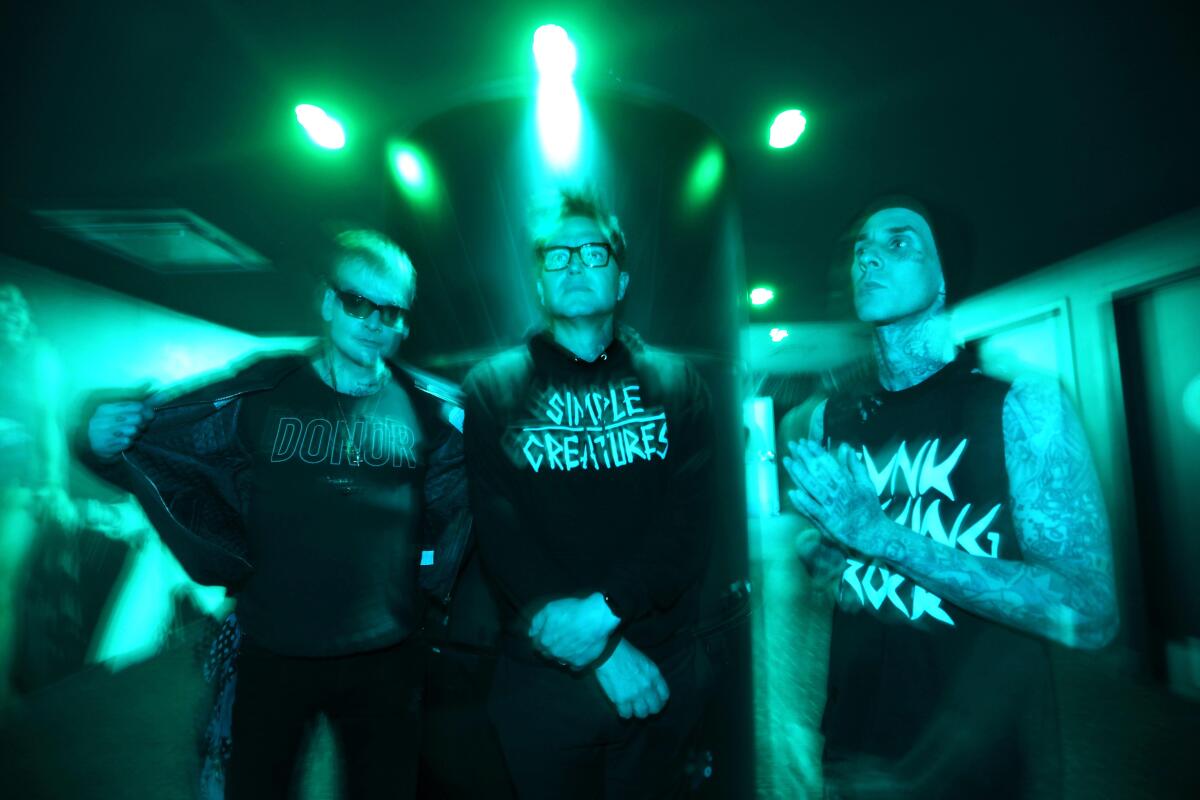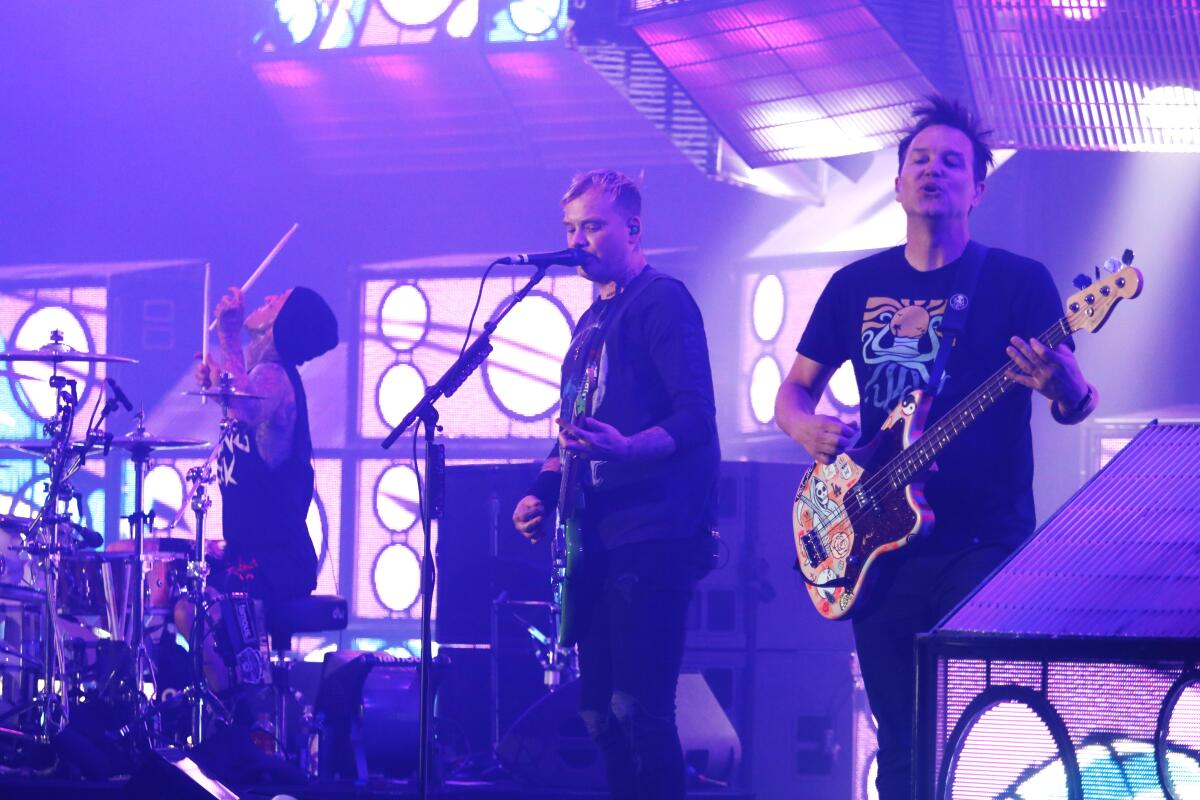Blink-182 were goof-punks with cute videos. Twenty years later, they’re having the last laugh

- Share via
Hours before showtime, Blink-182 singer-bassist Mark Hoppus is in the VIP lounge of the Forum in Inglewood, surrounded by generations of popular music. On the walls are vivid pictures of headliners from the past and present, from Led Zeppelin to Madonna, Neil Diamond to Guns N’ Roses, and Hoppus is contemplating how his pop-punk trio fits into that company.
In the normal arc of a pop music career, an artist might enjoy a season or three of major chart success and arena concerts. Only a small number survive decades at that altitude. Blink is still here, a full 20 years after its multiplatinum, career-defining “Enema of the State” album.
“Somehow Blink has had several do-over tokens,” says Hoppus, still bouncy but grown up at 47, his auburn hair standing up in a youthful, tousled Bazooka Joe spike. “We always try and write the best songs we can and put on the best shows that we can, but there’s lots of bands that do and don’t get the chance to continue to play the Forum. I don’t know what we owe our longevity to.”

The night before, Blink-182 — Hoppus, drummer Travis Barker and guitarist-singer Matt Skiba — were at an amphitheater in Chula Vista, close to the band’s San Diego birthplace, and near the end of a Southern California tour celebrating the 20th anniversary of “Enema.” The record contains several of Blink’s many radio hits and is the foundation to a seemingly open-ended longevity few might have predicted when they emerged from a garage as a trio of leaping, snarling, foul-mouthed goofballs.
“I used to drink before I walked on stage,” says Hoppus with a grin. “Now, an hour before we start, I take a couple of Advil.”
Founded by Hoppus, former singer-guitarist Tom DeLonge and original drummer Scott Raynor, Blink-182 arrived in the mid-’90s as pop-punk pranksters with irreverent tunes of adolescent frustration, delivering an avalanche of sex jokes and soaring pop choruses. Alongside Green Day, Blink’s takeover of MTV and pop radio helped introduce a suburban version of punk to a new wave of restless young fans. Their songs and accompanying videos — “All the Small Things” and “What’s My Age Again?” most indelibly — were angsty, juvenile, endearingly cute and loaded with irresistible hooks.

KROQ-FM has been an on-air home for the band in Southern California since the ’90s, and deejay Ted Stryker watched as the band “hit that sweet spot” where the wider pop culture embraced the three young punks. Soon they were on MTV’s pop-centric “Total Request Live,” sharing screen time with Britney Spears and the Backstreet Boys.
“I’ve seen it firsthand where a band will be afraid to take that next step in terms of going on a ‘TRL’ or doing something that hardcore fans don’t expect,” adds Stryker, who joined KROQ the same year “Enema of the State” landed in the mainstream. “It’s awesome that they did all that stuff. They were still the same Blink guys — just a lot more people knew who they were.”
“We would go to New York and they’d put us on ‘TRL,’” Hoppus recalls. “I’d look out that window and Times Square would be packed with fans. Or we’d show up for some MTV interview in Italy and there’d be thousands of people outside. We’re like, ‘Is Puffy coming by today?’ ‘No, that’s for you guys.’”
Blink also took note of real life, with Hoppus writing of suicide and loneliness on “Adam’s Song.” It was another hit single in 2000 but connected in a more profound way than the goofier tunes ever could.
“Those are the songs that personally mean the most,” Hoppus says. “It’s not just, ‘Let’s write a catchy song about falling in love with a girl in the summertime.’ Those songs are great, but when you write about something that is meaningful to you, upsetting to you — it means a lot more.”
With Blink’s newest album, “Nine,” set for a Sept. 20 release, the trio — now featuring Skiba, 43, who replaced Delonge in 2015 — is looking to reach beyond nostalgia by adding elements of hip-hop, electronics and modern recording techniques into an otherwise intact punk-rock mix.
“Making sure Blink isn’t different than modern music — rather than being something of the past — is a big achievement for me,” Barker says. Tattooed and athletic at 43, Barker’s schedule outside of Blink-182 is dependably packed with collaborations with of-the-moment DJs and hip-hop artists, including the rappers 03 Greedo and Lil Nas X.

Reality asserted itself in the making of the band’s new album on “Heaven,” a song initiated by Barker after a 2018 mass shooting barely two miles from his home, at the Borderline Bar and Grill in Thousand Oaks, where 12 people were killed. (The hooded shooter also committed suicide.) One of the victims at the Borderline had survived the shooting massacre at a country music festival in Las Vegas the year before.
On “Nine,” the sound is tense with postmodern effects and accelerated beats mingling with Blink-style vocal harmonies, as Hoppus sings: “Make a wish that you’ll get a chance to say goodbye / Before the shots ring out in the dead of night.”
The song’s message had even more resonance for the band this summer, long after it was recorded, when Blink had a day off in El Paso on Aug. 3. Hoppus had just finished breakfast at a coffee shop with his wife and son, with tickets to see a movie nearby at the Cielo Vista Mall, when he was contacted by the band’s security.
“We were walking out of the restaurant to head over there and our security texted saying, ‘Hey, there’s an active shooter in the area. You should probably come back to the hotel,’” Hoppus says of the attack that killed 22 at the mall’s Walmart.
Blink canceled the next night’s El Paso show “in solidarity with the community,” the band announced via Twitter.
“It’s ridiculous that we all collectively are like, wait, which one was that?” Hoppus says. “Was that the nightclub shooting or the school shooting or the movie theater shooting or the food festival shooting or the mall shooting? You can’t even keep track of it. You’re at a level of outrage about gun violence that is unhealthy to sustain.”
The new album is the second since the departure of DeLonge, whose interests in UFO research and his other band, Angels & Airwaves, became his central focus, leaving much less time for a frustrated Blink. Their breakup was public and acrimonious. After resolving legal issues with DeLonge, Barker and Hoppus continued with the band.
In recent interviews, DeLonge has said he’d like to return to the trio at some point. Hoppus doesn’t rule anything out. “I’ll never say never. But we don’t have plans to do that,” says Hoppus, who talked to DeLonge for the first time in two years just before the tour began. They met as teens in 1992.
“It was a phone call saying everything’s cool. No hard feelings. How’s your family? How’s life?” Hoppus said.
To fill DeLonge’s position, Blink turned to the Alkaline Trio’s Matt Skiba, who first met the band through producer Jerry Finn.
All three live in the Los Angeles area, including Hoppus in Beverly Hills with his wife and son, after several years residing in the U.K. For Barker, whose domestic life with ex-wife Shanna Moakler was famously documented a decade ago on MTV’s “Meet the Barkers,” his two kids are usually nearby.
After surviving a 2008 private plane crash with his friend and EDM partner, Adam “DJ AM” Goldstein, Barker faced a series of health issues, but is now fully recovered. He keeps a full schedule on the road, including a daily three-mile run and work on multiple recording projects off stage. After Blink concerts, Barker often follows with a DJ gig across town.
“Travis keeps himself busy all day long,” Hoppus says. “I’m cool to just sitting in a room and looking at my phone for an hour.”
After establishing his bona fides with Blink-182, Barker branched out into other projects and genres, collaborating as drummer, songwriter, producer and impresario. The Fader recently called him “rap’s favorite drummer,” with credits alongside the likes of Lil Wayne and Kendrick Lamar.
Based on his experiences in that company, Barker insists rock remains a vibrant, influential form. “A lot of the rappers and artists outside of rock I work with, they’re talking about rock music and are inspired by rock music,” he insists. “If there’s cool melodies and cool sounds within the track, that’s what really inspires people.”
For Hoppus, the struggle to create songs that are melodic and meaningful is the same as it ever was, as Blink faces an audience that now includes original Blink fanatics hitting their 40s and another generation discovering pop-punk for themselves. “I wake up every day like, ‘I’m never going to write another good song,’” he says. “Then sometimes I’ll write a song, drive home, play it for my wife and go, ‘Look what we did today. Look at this awesome song.’ And then I wake up the next day and go through the whole thing all over again.”
More to Read
The biggest entertainment stories
Get our big stories about Hollywood, film, television, music, arts, culture and more right in your inbox as soon as they publish.
You may occasionally receive promotional content from the Los Angeles Times.











